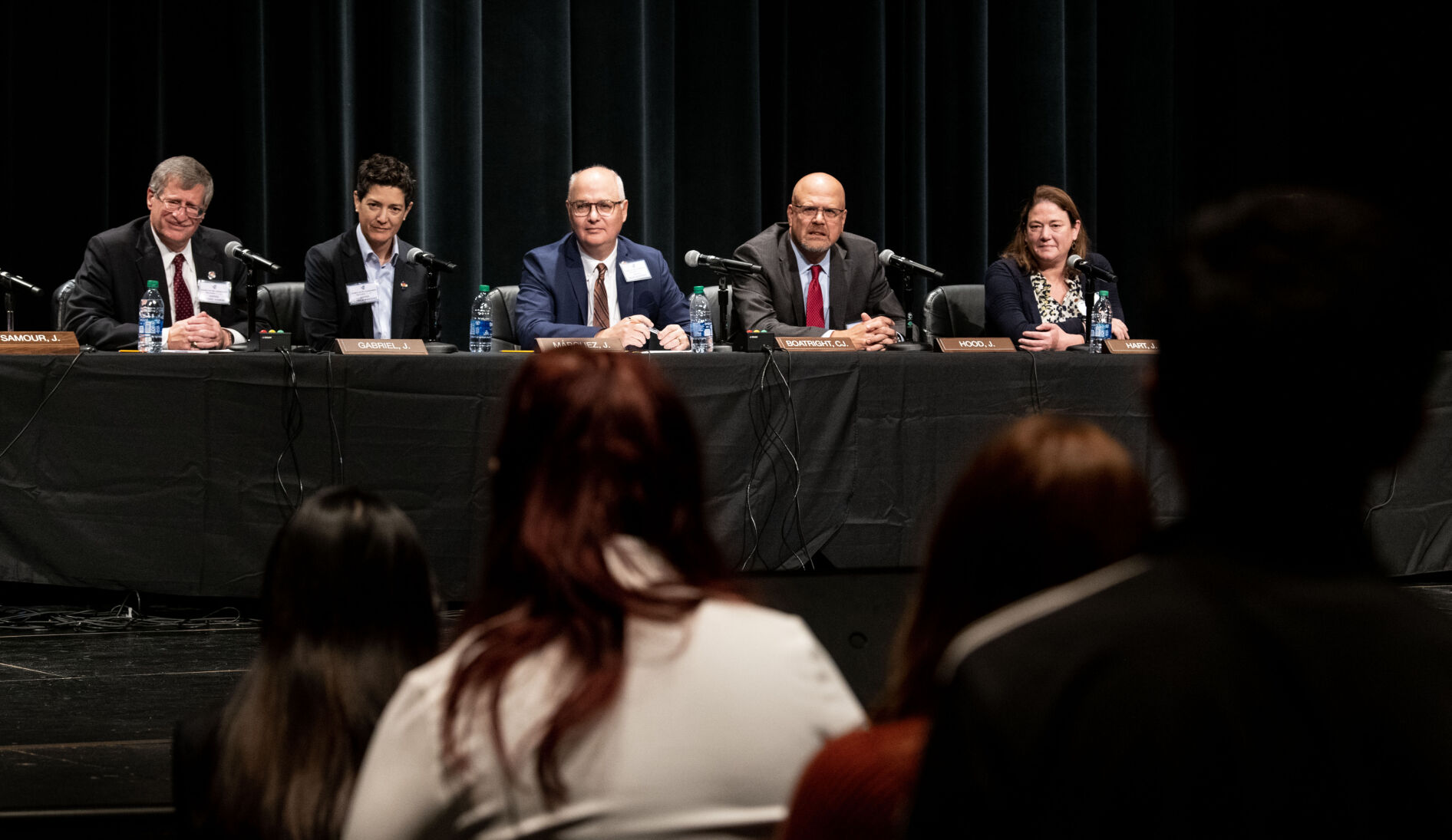Colorado Supreme Court accepts 2 cases on capital punishment, racially-biased juror

The Colorado Supreme Court agreed to hear two criminal appeals on Monday that question whether defendants are entitled to bail for crimes that formerly qualified for a death sentence, and whether a Black man convicted in an overwhelmingly white county deserves a new trial because one juror admitted he “didn’t want diversity.”
At least three of the seven justices must consent to grant an appeal.
One case out of Adams County involves an issue the Supreme Court has not addressed since the legislature abolished the death penalty in 2020, and the other case from Gilpin County featured an unusually-fractured decision from the state’s Court of Appeals.
Remnants of the death penalty
Two years ago, Gov. Jared Polis signed into law a measure abolishing capital punishment for the most serious offenses – class 1 felonies.
The state constitution, however, still references the death penalty. In one section guaranteeing criminal defendants the right to bail, the constitution creates exceptions for repeat felons who are dangers to the public, for crimes of violence committed while on probation, and for “capital offenses when proof is evident or presumption is great.”
Adams County prosecutors charged Jerrelle Aireine Smith with murder after deliberation, which is a class 1 felony, and racketeering. The government alleged Smith, while not the triggerman, was “intricately involved” in the murder of Ryan Dillard in October 2021, stemming from a larger payroll scam.
One year later, appearing before District Court Judge Robert W. Kiesnowski Jr., Smith’s attorney argued that capital punishment no longer exists in Colorado and, therefore, Smith should be eligible for bail.
“Logically, I think you’re absolutely right,” Kiesnowski responded. However, “I have to follow the laws in Colorado. And the law is that notwithstanding that we don’t have the death penalty, it’s still classified as a capital offense.”
Pursuant to the constitutional language, Kiesnowski found “proof is evident or presumption is great” that Smith was involved in Dillard’s murder, and he refused to release Smith on bond.
Smith then appealed to the Supreme Court, arguing that in the absence of capital punishment, his alleged crime fell under the constitutional guarantee for bail.
“Certainly, the public’s faith in republican government would suffer if, in the wake of a historic and major legislative change, the judiciary – the branch tasked with interpreting the Colorado constitution and construing legislation – chooses to remain silent knowing that silence threatens the exercise of an absolute state constitutional right,” wrote attorney Adrienne R. Teodorovic.
She alleged that, since the abolition of capital punishment, trial judges have refused to set bond for class 1 felonies. Consequently, Teodorovic asked the Supreme Court to decide whether class 1 felonies still count as capital offenses for which criminal defendants have no right to bail.
“And, allowing the issue to persist will have the consequence of district courts continuing to follow obsolete rules of law to deny an accused the absolute right to bail, and thus, the full gamut of the presumption of innocence to which he is entitled,” Teodorovic continued.
The case is Smith v. People.
The juror who scorned ‘diversity’
A Gilpin County jury convicted Reginald Keith Clark of kidnapping a woman from Denver, driving her to the mountains near Black Hawk and sexually assaulting her. He received a sentence of 18 years for kidnapping and 12 years to life for the sex offense.
Clark is Black and his victim was white. During jury selection, Clark’s attorney raised the fact that Clark was the only Black person in the room. One member of the jury pool, Juror K, then volunteered his thoughts about the issue of diversity.
“Yes, it’s obvious there’s a Black gentleman over there. This is Gilpin County. I moved to Gilpin County. I didn’t want diversity,” Juror K said. “I hear the things, that diversity makes us stronger and things like that. I don’t quite believe it in life from what my personal experiences are. And I can’t change that. I can look and judge what is being said by your side and their side and be fair, but I can’t change that.”
After the parties spoke with then-District Court Judge Dennis J. Hall, the judge asked Juror K if he could perform his duties based on the evidence. Yes, Juror K responded. Although the defense moved to dismiss Juror K for cause, Hall denied the request.
Juror K expressed “a political view, I think,” Hall elaborated. “That doesn’t really answer the question of whether he can be a fair juror. And a person can certainly have offensive views and still apply the law. Those two things are really separate in my mind.”
The defense later removed Juror K using one of its allotted “strikes.”
On appeal, the question was whether Hall improperly handled the challenge to Juror K and, if so, whether Clark deserved a new trial. In an unusual decision from a three-judge panel of the Court of Appeals, two judges believed Hall was wrong to keep Juror K. But a different combination of two judges decided the error did not require reversal.
And, in yet another unusual move, all three judges authored separate opinions last year explaining their rationale. Juror K, wrote Judge Terry Fox for the majority, was a biased juror who should have been removed.
“Although his opinion can theoretically be framed as a political view, the glaring implication persists: his acknowledged bias against nonwhite people like defendant,” she wrote for herself and Judge Timothy J. Schutz.
At the same time, Fox, now writing for herself and Judge John Daniel Dailey, rejected the notion that the brief time Juror K spent in the jury pool before the defense excused him had “infected the jury pool or the trial.”
Dailey, in his opinion, wrote that he would not automatically find a juror to be unfit to serve if they held “any degree (however slight) of racial prejudice or bias.”
Schutz argued that racial prejudice has historically occurred with Black male defendants and white female victims. He believed it compromised the fundamental fairness of the trial for Hall to permit a juror who explicitly spoke of his racial bias to continue with jury service.
“The decision to permit a racially biased prospective juror to continue on the panel spoke not only to Clark, but also to the greater community,” Schutz wrote. “The message sent was that a prospective juror could sit in judgment of a person against whom he had an acknowledged racial bias.”
Clark appealed to the Supreme Court, arguing that Schutz’s opinion was the correct one.
Given the dynamic of a Black defendant and white victim, “this trial court was not vigilant against racial bias. By denying the causal challenge to a racially biased juror, the court stamped the juror’s comments with the judicial system’s mark of approval,” wrote public defender Casey Mark Klekas to the court.
The justices agreed to review the appellate panel’s handling of the biased juror question. The court will also analyze whether one juror’s comments during deliberations that a jury “must deliberate until a unanimous verdict was reached” was the type of information that triggers an inquiry into whether “extraneous prejudicial information” affected the verdict.
The case is Clark v. People.












